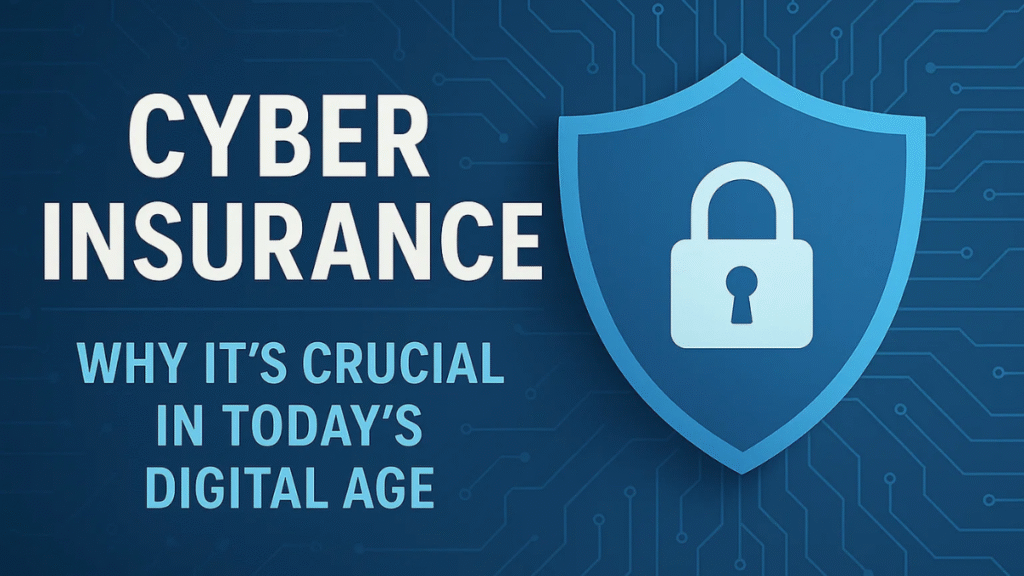In an era where businesses, governments, and individuals rely heavily on digital systems, cyber threats have become one of the most severe risks of the modern world. From large corporations to small start-ups, from financial institutions to healthcare providers, no one is safe from the increasing sophistication of cybercriminals. These threats include ransomware attacks, data breaches, phishing schemes, identity theft, and system shutdowns—each capable of causing financial, operational, and reputational damage. As organizations shift more operations online, cyber insurance has emerged as a crucial risk-management tool. It helps businesses survive cyber incidents by providing financial support, expert assistance, and structured recovery processes. This article explains why cyber insurance is essential in the digital age, how it works, what it covers, and how to choose the right policy for your needs.
Understanding Cyber Insurance
What Is Cyber Insurance?
Cyber insurance—also known as cyber liability insurance—provides financial protection and support against cyberattacks, data breaches, and other technology-related risks. Its primary purpose is to help organizations recover from cyber incidents without suffering catastrophic financial loss.
Why Cyber Insurance Matters Today
With cybercrime expected to rise dramatically every year, businesses face increasing risks. Traditional insurance policies often exclude cyber incidents, making cyber coverage indispensable. Cyber insurance helps companies continue operations, protect customer trust, and manage costly legal and technical processes after an attack.
Rising Cyber Threats in the Digital Era
Growing Sophistication of Cyberattacks
Cybercriminals now use advanced tools such as AI-driven threats, deepfakes, automated hacking bots, and social-engineering scams. These sophisticated methods make even technologically advanced organizations vulnerable.
Increased Dependency on Digital Infrastructure
From cloud computing to automated workflows, digital dependence has reached unprecedented levels. Remote work cultures, digital payments, and connected devices have expanded the cyber risk landscape further.
Higher Data Value and Data Exposure
Businesses store more sensitive data than ever—customer information, financial records, intellectual property, and health data. The more valuable the data, the higher the likelihood of an attack.
What Cyber Insurance Typically Covers
First-Party Coverage
This covers the losses that directly impact your business.
1. Data Breach Response Costs
Covers investigations, notifications to affected customers, credit monitoring services, and crisis management expenses.
2. Ransomware and Cyber Extortion
Provides financial support if criminals demand ransom through malware or encryption of systems.
3. Business Interruption Losses
Compensates for income lost when a cyberattack shuts down operations.
4. Data Restoration and System Repair
Covers costs for recovering lost data and repairing damaged digital systems.
5. Forensic Investigation
Helps determine how the attack occurred and prevents future occurrences.
Third-Party Liability Coverage
This protects your business from legal action following a cyber incident.
1. Legal Defense and Settlements
Covers legal fees and settlements if customers or partners sue due to a data breach.
2. Privacy Liability
Protects against claims related to unauthorized access or misuse of customer data.
3. Regulatory Fines and Penalties
Supports compliance with data protection laws such as GDPR, HIPAA, and national cybersecurity regulations.
4. Media Liability
Covers issues arising from online content, copyright infringement, or accidental disclosure.
Financial Importance of Cyber Insurance
Cost of Cyberattacks Is Skyrocketing
Cyberattacks can cost organizations millions. Even small businesses face bankruptcy risks from unexpected financial burdens such as downtime, legal fees, and recovery expenses.
Insurance Provides a Financial Safety Net
Cyber insurance ensures that businesses do not bear the full weight of an attack. It enables faster recovery with reduced financial stress.
Cyber Insurance Enhances Business Resilience
Improved Risk Management
Insurers often provide risk-assessment tools, cybersecurity training, and system audits that help strengthen overall digital defenses.
Access to Cybersecurity Experts
Policies typically include access to digital forensic teams, legal experts, and crisis communication professionals.
Supports Continuity Planning
By covering business interruption losses, cyber insurance ensures that operations can resume quickly after a data breach or attack.
Who Needs Cyber Insurance?
Small Businesses
Small companies are frequently targeted due to weak security infrastructure. Cyber insurance protects them from overwhelming financial losses.
Large Corporations
Even with advanced systems, large organizations attract high-level cybercriminals due to the value of their data.
Healthcare Providers
Hospitals, clinics, and laboratories store sensitive information and depend heavily on technology.
E-Commerce Businesses
Online stores experience constant risks—from payment fraud to customer data breaches.
Educational Institutions
Schools and universities face rising cyber threats due to large data repositories and remote learning systems.
Choosing the Right Cyber Insurance Policy
Assess Your Cyber Risk Level
Evaluate your organization’s size, digital exposure, data storage practices, and industry vulnerabilities.
Understand What’s Included
Not all policies are equal. Review coverage for ransomware, social engineering, business interruption, and system restoration.
Check Coverage Limits
Ensure that policy limits match your potential risk exposure. Low coverage can leave gaps during large-scale attacks.
Evaluate Exclusions
Understand what the policy does not cover—such as insider threats, outdated systems, or poor maintenance.
Review Insurer Reputation
Choose insurers known for strong cybersecurity partnerships and reliable support during crises.
Cyber Insurance and Legal Compliance
Meeting Regulatory Requirements
Many industries require mandatory cybersecurity measures. Cyber insurance supports compliance with data protection regulations.
Protection Against Government Penalties
If authorities impose fines after a breach, cyber insurance helps mitigate these expenses.
The Role of Cyber Insurance in Crisis Management
Immediate Incident Response
When a cyberattack occurs, prompt action is crucial. Cyber insurance provides rapid-response teams and structured protocols.
Reputation Management
Insurers often include public relations support to protect brand image after an incident.
Customer Communication Support
Properly notifying customers helps maintain trust and avoids legal complications.
Future of Cyber Insurance
AI-Driven Security Solutions
Insurers may integrate AI-based tools for real-time threat detection, risk scoring, and automated prevention.
Stricter Underwriting Standards
As cyber threats evolve, insurers will require businesses to maintain stronger cybersecurity practices to qualify for coverage.
Growth in Demand
As digital transformation accelerates, cyber insurance will become a standard requirement across all industries.
Conclusion
Cyber insurance has evolved from a luxury to a necessity in today’s digital-first world. With the rise of ransomware, data theft, and online fraud, organizations cannot rely solely on firewalls and antivirus systems. Cyber insurance provides financial protection, expert support, and a structured recovery plan that helps businesses minimize downtime and maintain customer trust. By choosing the right policy and strengthening internal cybersecurity practices, companies can safeguard their operations and future growth in an increasingly risky cyber landscape.
FAQs
1. What is cyber insurance and why do I need it?
Cyber insurance protects businesses from financial losses due to cyberattacks or data breaches. It is essential because cyber threats are rising and can cause severe financial damage.
2. Does cyber insurance cover ransomware attacks?
Yes, most cyber insurance policies cover ransomware, including ransom payments, negotiation services, and recovery costs.
3. Can small businesses benefit from cyber insurance?
Absolutely. Small businesses are common targets and often lack resources to recover from attacks, making cyber insurance crucial.
4. What factors determine the cost of cyber insurance?
Cost varies based on business size, industry, data sensitivity, security measures, and past cyber incidents.
5. Is cyber insurance required by law?
Cyber insurance is not mandatory, but many industries have data protection regulations that strongly encourage or indirectly require it.


